Table of Contents
- What Is a Family History Questionnaire
- 9+ Family History Questionnaire Templates in PDF | DOC
- 1. Cancer Family History Questionnaire Template
- 2. Family Medical History Questionnaire Template
- 3. Family History Questionnaire Example
- 4. Family History Questionnaire Template in PDF
- 5. Family Hereditary History Questionnaire Template
- 6. Family History Screening Questionnaire Example
- 7. Comprehensive Family History Questionnaire Template
- 8. Simple Family History Questionnaire Template
- 9. Martial Family History Questionnaire Example
- 10. Family History Questionnaire Example in DOC
- How to Make a Family History Questionnaire
- FAQ’s
- 1. What is a questionnaire?
- 2. What is medical history?
- 3. What is pedigree analysis?
9+ Family History Questionnaire Templates in PDF | DOC
You might be up and running now with no signs of impairment and disease, but the risk of contracting an illness may not be far off. Little do you know, it might be running on your very veins, waiting for triggers of an unhealthy lifestyle and neglected health concerns before striking. Genetic health implications are a major concern for health professionals. This is why they demand an accurate account of your background through a family history questionnaire. This helps them identify your potential risks and, in doing so, propose preventive measures on how to avoid inheriting the dangers of your genealogy’s past.

What Is a Family History Questionnaire
Upon assessing the risk of inherited diseases, Dr. Soren Snitkers of the University of Maryland School of Medicine says that while some conditions certainly come with your genetic makeup, others are caused by “increased risk” and could certainly be avoided with a lifestyle shift. To prove this, he and his colleagues made a study among an Amish population who have the FTO, a gene that causes obesity. Results revealed that those who have the same genes who exercised didn’t gain any weight. This is where your family and ethnic background becomes important. Knowing what risks you might help you perform proactive solutions to overcome them.
A family history questionnaire is an important tool for this purpose. It contains a set of questions to determine a patient’s family record. It is often given to a new physician handling a new patient. Moreover, this helps medical professionals evaluate a person’s condition and how his or her family’s files may affect it. When a significant risk is identified, the doctor can propose preventive methods and avoid it from happening.
9+ Family History Questionnaire Templates in PDF | DOC
1. Cancer Family History Questionnaire Template
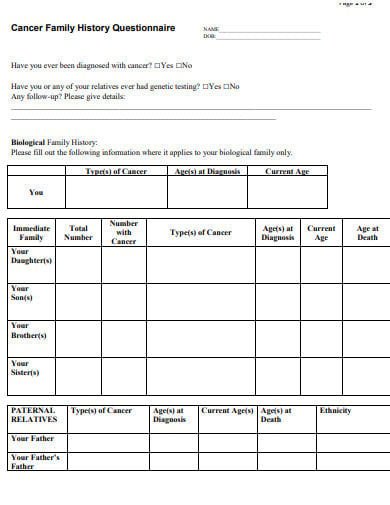 cancer.net
cancer.net2. Family Medical History Questionnaire Template
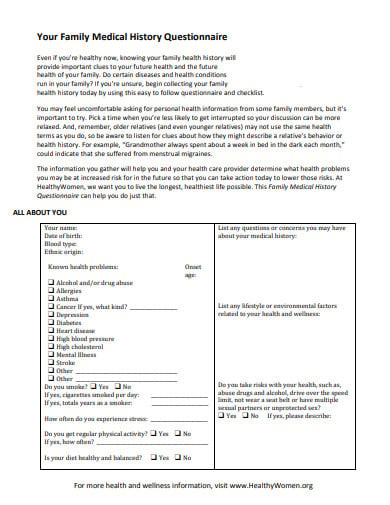 healthywomen.org
healthywomen.org3. Family History Questionnaire Example
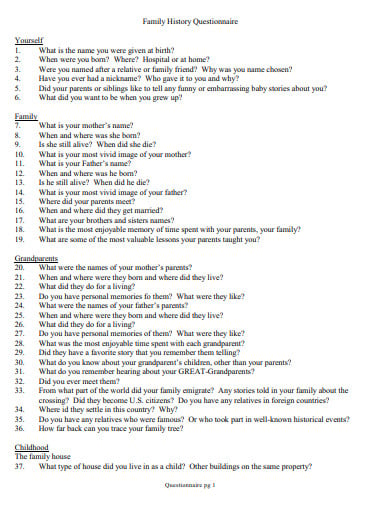 bobcatsworld.com
bobcatsworld.com4. Family History Questionnaire Template in PDF
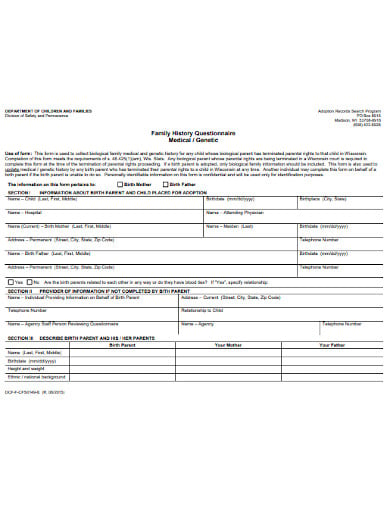 dcf.wisconsin.gov
dcf.wisconsin.gov5. Family Hereditary History Questionnaire Template
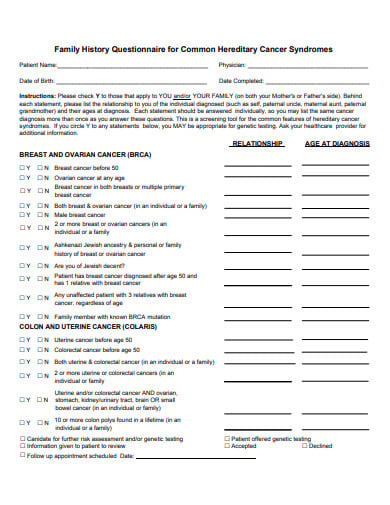 swedish.org
swedish.org6. Family History Screening Questionnaire Example
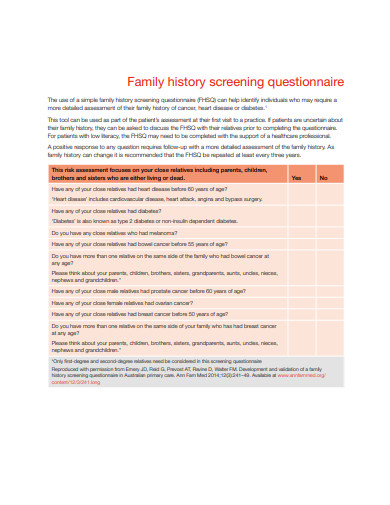 racgp.org
racgp.org7. Comprehensive Family History Questionnaire Template
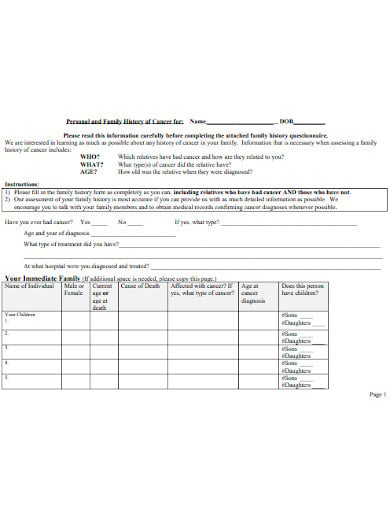 smh.com
smh.com8. Simple Family History Questionnaire Template
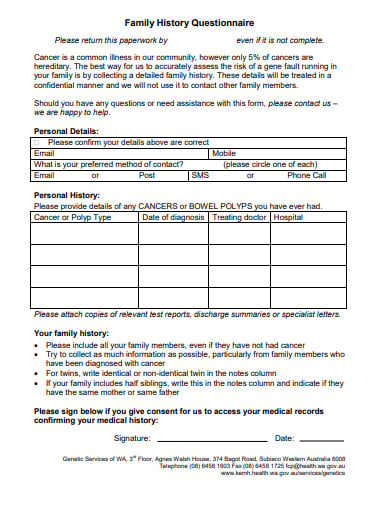 health.wa.gov
health.wa.gov9. Martial Family History Questionnaire Example
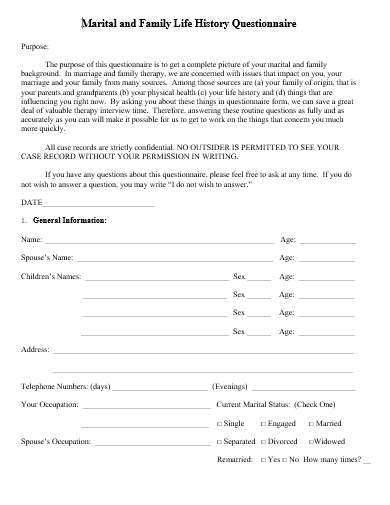 seasonsinourlife.com
seasonsinourlife.com10. Family History Questionnaire Example in DOC
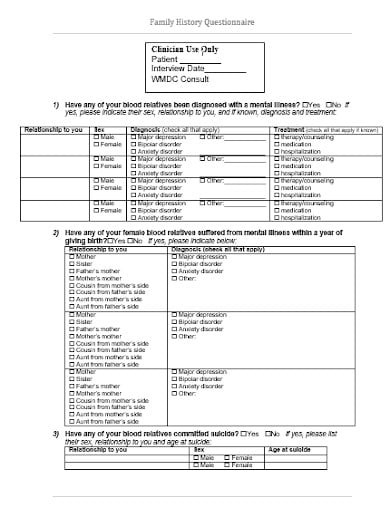 hopkinsmedicine.org
hopkinsmedicine.orgHow to Make a Family History Questionnaire
A family history questionnaire plays a significant role in promoting the well-being of every individual. The record doesn’t only contribute to a person’s current condition, but it will also help future generations. Read the guidelines below on how to create this efficient tool:
1. Know What to Include
Know what information you need to get out of the form. Aside from the names and the age of your relatives, it’s also necessary to include their ethnic background. Study shows that some diseases are more prevalent in a specific race or group of people. You also need to include questions about the presence of chronic diseases, mental health conditions, and pregnancy complications in the family. These information contribute to knowing the risk factors that the doctors need to assess. To know more, look for medical history samples and find out how they’re structured for your reference.
2. Make a Content Outline
Upon knowing what data to include in your questionnaire, outline them using a rough draft. Arrange your item questions into a neat list and decide how you want to make them appear on an actual layout. This activity helps you visualize the finished product, making the process easier to accomplish because you already have an idea in mind. This also aids you in assessing each questionnaire item and determining whether or not they’ll earn a space on the form.
3. Categorize Comprehensively
A family history questionnaire can be lengthy for a reason. It needs to cover up to the third degree of your relatives, which could include your mother and father’s families alongside their siblings’ families and children. This stretch could hold too much information and maybe confusing during the assessment of the document. Categorize all data accordingly. As an example, you can divide the information according to the person’s family sides. You can also start from the gathering with the oldest members (grandparents) up to the youngest to achieve a hierarchical flow.
4. Use Consistent Formatting
Consistent formatting also contributes to your questionnaire’s comprehensibility. Imagine having to go through several pages of a questionnaire that contain a mix of checklists, fill in the blanks, and tables, among others. This could confuse the one answering and may leave you with answers that could be incorrect. Employ a mix of one or two styles and stick with it all throughout the document.
FAQ’s
1. What is a questionnaire?
A questionnaire is a document that contains a series of questions often used for research and statistical purposes.
2. What is medical history?
Medical history is a comprehensive account of a person’s health records, which includes the history of past diagnoses, allergies, operations, immunizations, test results, prescribed medicines, and medical family background.
3. What is pedigree analysis?
Pedigree analysis refers to the process of explaining the information presented on a pedigree. A pedigree is a family tree diagram that uses symbols and determines the disease or medical conditions of each member. This helps identify a disease pattern among the bloodline.
History may have had its time, but it still holds imminent power over the present. This applies especially in the field of medicine. Professionals consult past findings and refer to old cases and couple it with today’s innovation to produce the best solutions. This is also true for assessing an individual’s health and wellness. Paying no attention to what past implications might mean for your today could result in dilemmas that could’ve been evaded through a little peek on your family’s history. Your family tree may not only be a means to trace your lineage; it could save lives as well./

